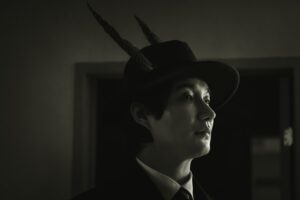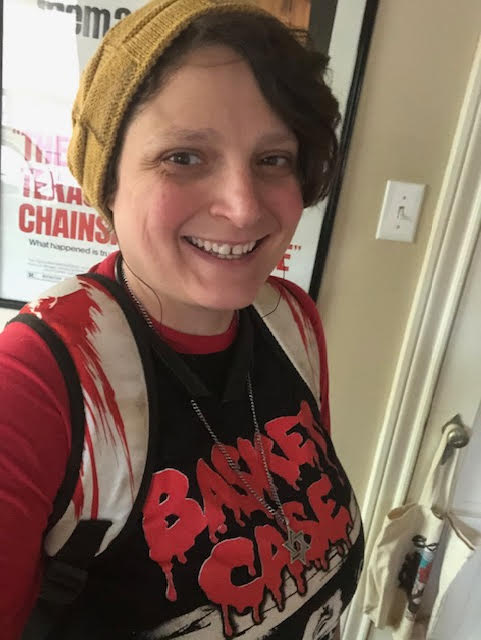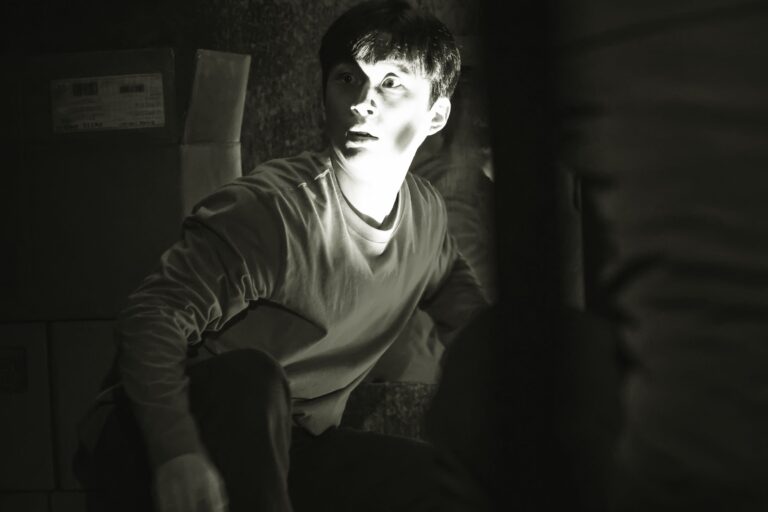The Tenants directed by Yoon Eun-Gyeong, played at the Fantasia International Film Festival last week and engaged audiences with its haunting portrayal of a dystopian Seoul. This chilling thriller (often dubbed Kafkaesque by internet critics) dives deep into the pollution-filled reality of skyrocketing rents and suffocating air quality. The story follows Shin-dong (Kim Dae-gun), a young man teetering on the brink of eviction who resorts to renting out part of his apartment to a bizarre couple. As his life spirals into a surreal nightmare, the film’s eerie black-and-white cinematography and dystopian themes paint a vivid picture of urban decay and the erosion of identity. The Tenants is one of the festival’s hidden gems. It offers a smoggy reflection on the harsh realities of city life, where every breath feels borrowed and every inch of space is a battle for survival.
In The Not-So-Distant Future
Shot in stark black and white, The Tenants presents a not-so-distant future Korea. Hazardous air pollution plagues the cityscape, which transforms the vibrant metropolis into a monochromatic maze of smog and sameness. In this dreary setting (where the air is as thick as the uniformity of the people’s drab attire) Shin-Dong navigates a life gradually eroded by relentless bills and mounting medical expenses. And as pollution clouds the city and identity fades into the background, Shin-Dong’s plight grows increasingly worse. Ultimately, he resorts to using the Wolwose system in hopes of making his bills more manageable.
The Wolwose system (designed to profit from the small corners of already cramped living spaces) forces Shin-Dong to rent out parts of his apartment just to stay afloat. Desperation leads him to accept new tenants (Heo Dong-Won, Park So-Hyun). And instead of opting for a conventional room, they bizarrely request to occupy his only bathroom.

An Oddly Engaging Film
Despite its visually sparse settings (mostly confined to a drab workspace and a monotonous apartment) The Tenants remains oddly engaging. The film shies away from action and instead focuses on one-on-one conversations and Shin-Dong’s inner turmoil. As we delve deeper into Shin-Dong’s life, it becomes painfully clear how little control he has over his own existence. He solely interacts with a friend on the phone and the enigmatic tenants occupying his bathroom. The more his job consumes him, the more his apartment feels like someone else’s space. The bathroom is no longer his sanctuary and late-night disturbances from his tenants are robbing him of sleep. Adding to the film’s bleak landscape, Shin-Dong discovers the Cheonjangsae (or the ceiling people) who are a class so marginalized that their existence is barely acknowledged. These individuals, considered mentally unstable and dangerous, embody the ultimate loss of identity in this polluted, dehumanizing cityscape.
This Story Isn’t As Farfetched As You Think
At some point, most of us have had to share our living space with another person (whether it’s a roommate down the hall, a dorm mate, or a friend crashing on the couch). Sometimes renting out a room is necessary just to make ends meet, and occasionally, even more drastic measures are required. When I lived in South Korea, I knew an English teacher who relocated from America for a job. Upon arrival, he discovered that the school that sponsored his move didn’t have an apartment ready for him. Instead, they offered him a space in the school manager’s apartment. Not a room, but a space on the floor in the bedroom closet.
You might wonder why anyone would accept such a cramped, demeaning situation. The answer: financial necessity. Surely he quickly saved up money and found his own place? Wrong. He lived in that closet for a year because he could not afford to move back to America and wasn’t paid enough to find another place nor quit his job. He had to wait until the contract ended and then they would pay for him to return to his country.
I met this man in 2010, but this harsh reality parallels the plot of The Tenants, a dystopian film set in a similar South Korean backdrop. In horror, we often question, What keeps you from leaving a cursed or dangerous place? The answer is usually financial constraints. But beyond that, it’s as if the place itself refuses to let them go. Just as a haunted house might possess its occupants, a decaying city will manipulate and control its residents, trapping them in a cycle of devaluation and despair.

Technically Speaking…
Beautiful, haunting, and, despite its slow pacing, The Tenants is mesmerizing and surreal. The film’s phenomenal sound design and the actors’ compelling performances immerse us in a claustrophobic world where individuality is eroded, and leaves behind only cold, lifeless masses. The stark black-and-white cinematography amplifies the film’s bleak, dystopian vision, and captures a cityscape where every corner feels like a prison. Though its deliberate pacing may test some viewers’ patience, the film’s eerie atmosphere and chilling portrayal of societal collapse make it a worthy viewing experience. The Tenants resonates as a powerful commentary on the dehumanizing effects of urban decay and systemic oppression and reflects how both haunted houses and dystopian cities can trap and suffocate their inhabitants. In the end, it’s a stark reminder of how oppressive environments can strip away personal identity and leave us struggling for survival in a world devoid of compassion.






